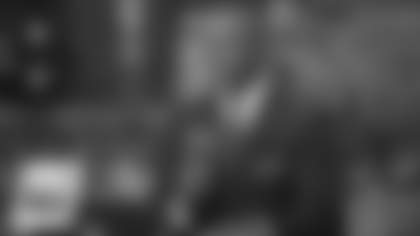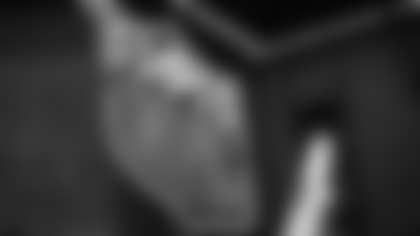EAST RUTHERFORD, NJ - The Coughlin Corner, Giants.com's exclusive weekly interview with head coach Tom Coughlin:
Q: You are obviously very familiar with the Dallas Cowboys because you play them twice a season and just faced them three weeks ago, but does the fact that this week they named Jason Garrett the interim head coach and Paul Pasqualoni the defensive coordinator create some strategic mystery as you prepare for Sunday's game?
Coughlin: "I don't know what to expect there. That's the issue because the offensive coordinator is now the head coach and he's still going to be the play caller. There will be some changes from a defensive standpoint, simply because the personality of the new defensive coordinator is such that he's been in all those meetings all year long and no doubt he's made his own decisions on what he liked and didn't like and what he thinks of the players. He's coaching the defensive line, so he will make some changes. I don't think there's any question about that, perhaps a blitz or two that he favors, a pressure, a coverage that they feel is more appropriate for where their team is right now rather than some of what they've been doing. I don't know what it will be."
Q: Is it a situation where you have to see what they're going to do and adjust on the fly?
Coughlin: "You're going to have to adjust to that, yes. We do some anticipating. We do know what Paul did in Miami (where he was the defensive coordinator last season). We've studied that tape, done some of the research there, but yes, there will be something different. There will be a different front, there will be something different that we're going to have to come to the sideline probably and work out."
Q: Is it an advantage playing a team twice within three games because you are so familiar with their personnel?
Coughlin: "It's an advantage because it's relatively fresh. The thing that is important, though, is that you have to go back and approach it as if you don't know anything about them. You have to make sure there's no stone unturned. So you have to go back and review all your notes from the first game, all your preparation. And then you take these two games since then, integrate them in, look at the numbers, see if the numbers balance out the way they did the first time. All of a sudden there is a flashing red light in some area - whoops there's a change there, they've done something different, there is different personnel showing up in different situations. You have to be aware of that."
Q: This is the eighth time as a head coach you've had a winning streak of at least five games, so you have experience in this situation. Earlier in the year you were 1-2, and maybe you had to help the players boost their confidence. Now that you're playing well, what do you have to do?
Coughlin: "Try to play better all the time. We try to make sure that the players understand that all we've ever been concerned with was our team, that our players play to the best of their ability and that our team plays to the best of its ability. And as that goes, that's the real challenge. When I look at the Dallas Cowboys, I look at a team that's 0-2 in the division, and we're 1-0. That's exactly as far as I go. We know full well that they're a very, very talented group of players and we, quite frankly, are not interested in all that's being said. The questions flip very fast in our business. You go from, 'You're no good, you're blah blah blah,' to now, it's 'How do you guard against (overconfidence?)' I hope that's not an issue, I really don't. We approach it the same way. We know that preparation is the key to success. We know that we have to make every practice - literally every practice has to be better than the team we're playing against, their practice. We understand that and for people to go into these meetings, they have to approach these meetings - that sign on the wall that we keep there is there for one reason - the sign that deals with humility: 'Prepare and practice as if you lost your last game.' That's exactly what I'm talking about, and I certainly hope that when people pass by that sign that there isn't any question about what that means. And I explained it to them yesterday."
Q: Eli Manning has thrown 12 touchdown passes in his last four games, so clearly he's throwing the ball very well. Could you give some insight about some of the other things he's doing well that are not as obvious, for example, his decision-making before and during a play?
Coughlin: "He's always done an outstanding job with his game preparation checks. He gets us in literally the right play a very high percentage of the time, provided the clock is in his favor. One of the things that I commented to him was exactly that, and he took that compliment and gave it back to the offensive line. He's using his head and shoulders very well to pull and maneuver people out of position, and then taking advantage of that. But he's doing that because, as he says, 'I have the time to do it.'
Q: Does the possibility of having only seven healthy offensive linemen this week give you a little bit of a pit in your stomach?
Coughlin: "Well, it's certainly not the ideal circumstance. You have a couple of guys (Shaun O'Hara and David Diehl) that have played around here for a long, long time and really have never missed anything and all of a sudden they're out. They've been out, a couple have been out, and now David Diehl, who's been literally an iron man - he has never missed anything - he's out, too. So it is a little bit different. But you know what happens, and it's truly the people who believe in this concept of team, you realize that during the course of the season there will be some things that will occur from time to time at different positions. Guys not only have to step up and play better, but everybody around them has got to do their job better so that we can help those individuals who perhaps haven't had an awful lot of playing time, who are just coming in like Kevin Boothe, (Mitch) Petrus just coming in - those types of things - just a rookie, help them do their job."
Q: In training camp, when you have the linemen work at different positions, is that done so in case a situation like this arises, you can plug them in, knowing they have some experience?
Coughlin: "The example is last weekend. In that game last weekend (the 41-7 victory in Seattle), David Diehl played left guard and played right tackle for one play, (Adam) Koets played center, Richie (Seubert) played center and guard, (Shawn) Andrews, who has been trained as a guard or a tackle, was at tackle the majority of the time, but Koets came in and played the big tight end, if you will. So guys did have some maneuverability and it did make a lot of sense to me although it's - sometimes in training camp you wonder if you're ever going forward. You've got guys here, there, everywhere, and you wonder, 'Where is the progress being made here?' But when you get into the season and you see the maneuverability that has to take place because of some things that happened even during the course of the game, you do get a little bit better feel for that part of it."
Q: David Diehl is the only player who has played in every game that you've coached here. Is it going to be noticeable for you that he's not out there?
Coughlin: "It's noticeable he's not out on the practice field. Jeez, I mean you certainly appreciate that kind of an example of a warrior that you know is just like anybody else - he's got injuries, he's got all kinds of things that he plays with - but he is a mentally tough guy. He's been able to play through a lot of things during the course of his time, but this one he's going to have to fight his way back and hopefully it'll come along fast."
Q: D.J. Ware ran well in the final drive in Seattle. You have a good thing going with Ahmad Bradshaw and Brandon Jacobs. Is there room for a third back in the mix?
Coughlin: "There usually is. There's room. I wouldn't even begin to say how it works, but there's room and we've done it with three before. One of the key things that happened last week that is just as much an eye-opener as the maneuverability of different guys up front on the offensive line is the fact that you had a fresh back in the fourth quarter who is blessed with speed, who really made a difference because he broke some tackles. He got some extra yardage, yardage after contact. If you take a look at one of our relatively long third-down runs, he literally was able to drag a couple people for the first down. So that was an interesting thing that we observed in that game as well. But I was glad that Danny Ware had a chance to play and that he did well. It's just another player that we need going forward."
Q: You held the ball for 19 plays (including three kneel-downs) and 13 minutes. Is that how you'd like to draw it up for all four-minute situations late in a game?
Coughlin: "Thirteen minutes, never throw a ball – yes, I would. The reality of that - and it's important for people to know because you see an awful lot of criticism about this in our league - very rarely, very rarely do you have a four-minute, quote-unquote - even though that was at the beginning of the fourth quarter and everyone knew what the score was - rarely do you have a four-minute drive that doesn't at some point, or maybe more than one point, have to have a pass get you a first down. That's just the way it is."
Q: You never needed to throw it.
Coughlin: "Well, we weren't going to let it happen at that time. We were going to run the ball four times if we had to, but I'm talking about a 24-21 game - the same thing we work on every Saturday morning - 24-21, you're up or you're down. Your offense has got the ball, you're up, the opponent's within a field goal, the opponent's got all three timeouts, he's using them, you've got to make a first down. Your idea is to go ahead and let him use up all his timeouts and then make a first down and then get it under two minutes - with a first down, you can kneel. But a lot of the time, you're going to have to throw it in order to get that first down."
Q: You played against (Dallas quarterback) Jon Kitna three weeks ago. He threw for 377 yards against the Giants in Detroit in 2007. He seems like a good guy to come in if you lose your quarterback. What are some of the attributes that make him effective?
Coughlin: "He's a veteran. He's been around a long time. He's been in all kinds of offenses. I remember him when he was the starter in Cincinnati. He's a talented guy, and he's been around a long time. He's a veteran player. He is a good leader. What they have gone through is, quite frankly, a lot of what we went through early on and even were able to win a couple games under those circumstances - one being in Dallas. In two ballgames, they've turned it over and they're minus-seven (turnover differential) and their turnovers have amounted to 42 points. It's hard to win now when you turn the ball over."
Q: They put Marcus Spears on injured reserve, but is their defensive front still formidable?
Coughlin: "Very formidable. (Stephen) Bowen comes in there, Bowen did a nice job the other day. (Jay) Ratliff has played end; he knows that defense very well. You've got the young kid (Josh Brent) they bring in when they rest Ratliff, he's done a good job. He's a big old load. So yes, Dallas is very talented."





